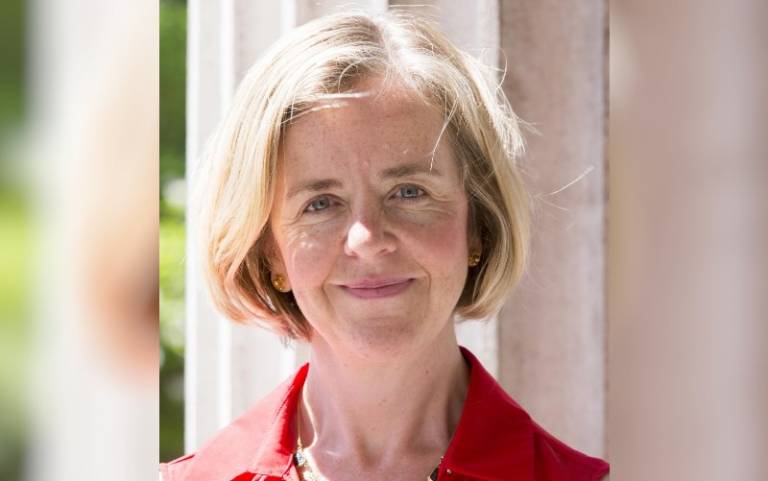A new report assessing the world's ability to respond quickly to a pandemic, co-authored by a UCL academic, has concluded that while progress was made on vaccines in 2023, attempts to ensure global availability of diagnostics and treatments were underfunded and lagging.

Professor Rachel McKendry (London Centre for Nanotechnology at UCL and UCL Division of Medicine) was part of the advisory group for the third report of the 100 Days Mission, which seeks to ensure global availability of diagnostics, therapeutics, and vaccines within the first 100 days of a pandemic threat.
The report concluded that there were limited approved tests, treatments and vaccines for WHO priority pathogens, with the exception of Covid-19 and Ebola Zaire.
The report was launched by the International Pandemic Preparedness Secretariat (IPPS), an independent body that serves to join up relevant states, the private sector, and global health institutions in support of the 100 Days Mission, at the Accademia dei Lincei in Rome.
The launch coincides with the start of Italy's G7 presidency. The IPPS and partners will urge leaders to break the cycle of "panic and neglect" and keep pandemic preparedness on the agenda in 2024.
Professor McKendry, who serves on the Scientific and Technical Advisory Group for diagnostics, said: "The COVID-19 pandemic has highlighted the central role of diagnostics in future pandemic preparedness. The humble lateral flow test reached further than any other testing format, enabling access to testing outside of healthcare settings including in workplaces, at borders, in schools, and self-testing at home.
"However, it took too long to develop and deploy diagnostic tests. Moreover, there were huge inequalities in access to tests, with just 0.4% of the 3 billion COVID-19 tests conducted worldwide, available in low-income countries, raising ethical concerns and constraining our collective ability to respond to the pandemic.
"This 100 Days Mission report highlights key implementation challenges and priority areas for the future, including the need for multiplexed tests to detect pathogens of epidemic potential, digitally connected tests and improved linkage to care. It is vital that we act now, learning the lessons from Covid-19, to ensure that we are better prepared for future pandemics."
Last year saw progress in vaccines R&D - including the first FDA-approved Chikungunya vaccine and Phase 1 trials for Crimean-Congo Haemorrhagic Fever (CCHF) vaccines - and strong political support for the 100 Days Mission from the G7 and G20 under the leadership of Japan and India respectively.
However, the new report highlights a concerning lack of investment in the R&D pipeline overall and signs of waning focus on pandemic preparedness.
New in 2024 is the 100 Days Mission Scorecard, which provides a comprehensive assessment of the pipeline for the WHO R&D priority pathogens of pandemic potential. Analysis completed by Policy Cures Research reveals very few approved products outside of COVID-19 and the Zaire Ebolavirus strain. The scorecard also highlights the global lack of funding for WHO priority pathogens except COVID-19. Between 2019 and 2022, COVID-19 saw US$14.5bn invested, eight times higher than the other nine pathogens put together. The scorecard also reveals a lack of diversity in funding sources, posing a risk to global preparedness.
Looking ahead to the presidencies of Italy and Brazil respectively, the 100 Days Mission Steering Group, Science and Technology Expert Group (STEG) and partners will urge the G7, G20 and regional organisations to catalyse coordinated international action, emphasising the global nature of the mission. They will call for political commitment to building virtual prototype libraries of pandemic therapeutics, diagnostics and vaccines, working with the private and philanthropic sectors to make most efficient use of limited resources.
Dr Mona Nemer, 100 Days Mission Steering Group Chair and the Chief Science Advisor of Canada, said: "As the world contends with multiple crises, we cannot forget the devastation of COVID-19 and the long-term impact it has had on populations, health systems and the global economy.
"The Third 100 Days Mission report shows encouraging progress in several areas, but being better prepared for the next pandemic will require heightened global focus, as well as support for the entire therapeutics pipeline and readily scalable and accessible diagnostics. Our priorities for 2024 reflect the very real need to double down on efforts to make this important mission a reality, to protect us all."
Sir Patrick Vallance, former UK Chief Scientific Adviser and outgoing 100 Days Mission Steering Group Chair, said: "These Annual Implementation reports are an opportunity to reflect on how close we are to achieving this important mission, set out the most critical priorities for action, and reflect on progress made in the last year.
"There is certainly progress to celebrate, and we must remain laser-focused on the original vision for the 100 Days Mission - preparing in advance, so we are ready to produce diagnostics, therapeutics and vaccines (DTVs) that enable the most efficient and equitable response possible to the next pandemic.
"Partnership is the lifeblood of this collective endeavour, and I am delighted to see such strong support from all sectors as we launch this report."
In June 2021, G7 Leaders welcomed the "100 Days Mission'' at a meeting in Carbis Bay, Cornwall. G7 scientific advisers called for the establishment of an International Pandemic Preparedness Secretariat to support implementation and catalyse scientific exchange on the progress of the mission.






